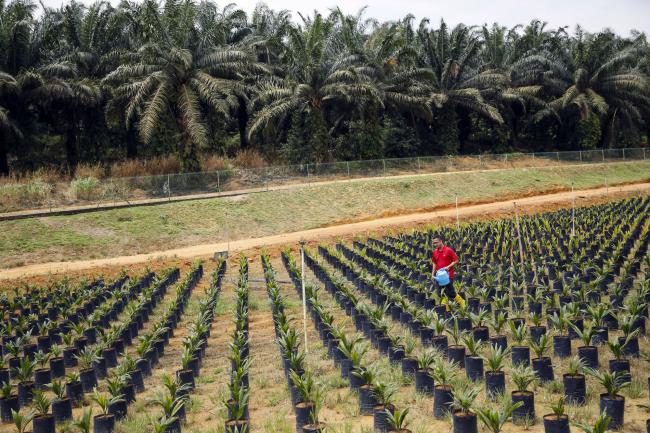(Bloomberg) -- The world’s most-used edible oil is having a horrendous year as a powerful mix of drivers pushes down prices -- from a slump in petroleum costs to allegations expanding plantations have destroyed orangutan habitats.
Benchmark futures in Malaysia have plunged about 18 percent this year, similar to the annual decline in 2017, with prices languishing near their lowest in more than three years. Used in everything from chocolate to fuel, palm oil will probably end the year at 2,000 ringgit a metric ton, according to a Bloomberg survey this month. That compares with 2,044 ringgit on Friday.
The slide spells more trouble for growers in Indonesia and Malaysia, who feel pinched as prices hover near output costs. The Kuala Lumpur Plantation Index is down 9.4 percent this year, on course for its biggest drop since 2014.
Here are some of the things dragging down palm oil:
1. Production, Stockpiles
Rising production and inventories, and lackluster shipments, have deepened a glut in the biggest producers Indonesia and Malaysia. Demand has simply not been enough to absorb rising supply, said Ivy Ng, regional head of agribusiness at CIMB Investment Bank Bhd. in Kuala Lumpur. Prices need to be even more attractive to lure buyers in India, the world’s biggest importer, she said.
Stockpiles in Malaysia may climb to 3.5 million tons by year-end, while in Indonesia they could swell to 5 million tons, says veteran analyst Dorab Mistry, director at Godrej International. He expects global supplies to grow 4 million tons next year. Investors are watching for signs of slowing production as the high output season passes. Malaysian output may ease from this month, while Indonesian production may peak between October-November, said CIMB’s Ng.
2. Biofuel
Godrej’s Mistry says biodiesel demand will be the most important price-making driver next year. Market participants are banking on Indonesia’s ambitious B20 biodiesel mandate, which requires conventional fuel to be blended with 20 percent palm-biofuel, to mop up supplies. Malaysia plans to implement its long-awaited B10 mandate in transport and other subsidized sectors in phases from Dec. 1, according to a letter sent by the Primary Industries Ministry to petroleum companies seen by Bloomberg News.
Much of the optimism over biofuel has come from palm oil’s discount to gasoil, which is also known as diesel and is used to power trucks. While there’s no exact optimum level, a $100 discount covers variable costs and encourages producers to export palm-biofuel. Palm oil turned to a discount to gasoil in April, and the differential widened to $220 a ton in October, but since then it has halved, posing an increasing threat to biodiesel demand.
3. Trade War
Palm oil hasn’t been spared by the U.S.-China trade tensions that’ve seen tit-for-tat tariffs upending agriculture markets and shifting trade flows especially for soybeans, which are crushed to produce a rival oil. Uncertainty stemming from the trade war has also kept investors jittery as they wait to see how vegetable oils will be affected. If tensions persist and China struggles to replace U.S. soybeans, buyers there may turn to palm oil, CIMB’s Ng said.
4. Demand Woes
Sluggish demand from key importers has clouded the outlook and kept buyers wary. In India, a cocktail of higher import duties, a weak rupee and a credit crunch have curbed the appetite for palm oil.
Palm oil faces another challenge: Purchases typically wane toward winter as the tropical oil tends to cloud in cold temperatures. Still, Chinese companies boosted purchases of palm oil last week, according to the China National Grain and Oils Information Center. The No. 2 importer may also ramp up purchases before the Lunar New Year festival in February, Ng said, although buyers may prefer Indonesian palm oil that’s more competitively priced.
5. Orangutans
And there are the orangutans. Palm oil’s image has taken a hit as a slew of negative publicity paints the tropical oil as a destroyer of rainforests and orangutan homes, resulting in governments and producers struggling to improve the public’s perception of palm oil and its marketability.
This month, Greenpeace activists were detained after staging a protest on a palm oil vessel en route to Europe. The group has also accused palm oil suppliers to Mondelez International Inc (NASDAQ:MDLZ). of destroying orangutan habitats in Indonesia, which came hot on the heels of a viral Christmas commercial attacking the tropical oil in the U.K.
The Malaysian government called the ad misleading and said it will “fight back.” The Indonesian Palm Oil Association said Greenpeace’s actions threatened 17 million Indonesians that depend on palm for a living.
(Updates price in second paragraph.)
